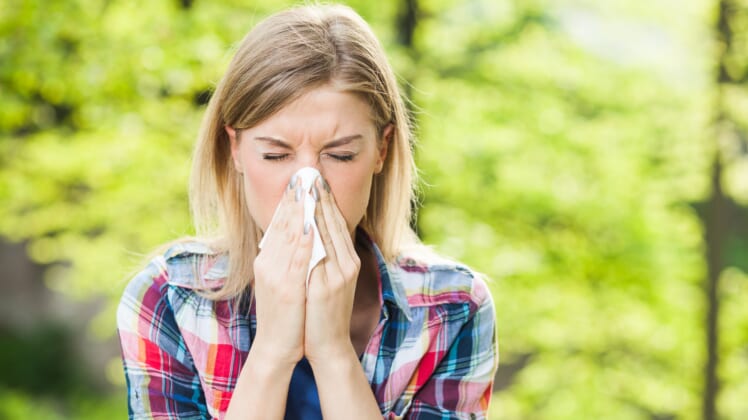
You’ve been looking forward to spring all winter long, and it’s finally here. But one culprit might still be keeping you indoors—seasonal allergies. What if you could find natural allergy remedies to treat your allergies and still enjoy the season?
Here are 6 natural allergy remedies (with proof) that can work for you:
Green tea
You might know about green tea’s powerful antioxidants and nutritional benefits. What you might have overlooked is its ability to fend off allergy symptoms.
According to a Japanese study published by the American Chemical Society, green tea’s characteristic component, EGCG, can fight those allergic reactions.
Researchers believe that it works by blocking the body’s production of histamine and immunoglobulin E (IgE), says ScienceDaily. Both are chief culprits for allergies, meaning green tea could significantly decrease your seasonal sniffles.
You should know that the researchers only studied this reaction on specific blood cells (the ones that release histamine). Previous studies have shown an anti-allergenic effect on animals, but more human research is needed.
In the meantime, try sipping on a cup of green tea a day and see what happens. It’s known for a host of other nutritional benefits too, including disease-fighting antioxidants.
HEPA filters
Next, you could consider a HEPA filter for your home (HEPA stands for high efficiency particulate air). Many clinicians advise this measure since HEPA filters can reduce the overall level of allergens in the home.
One study published in Current Allergy and Asthma Reports, found that HEPA filters work best when one filter is used per room.
Don’t want to buy that many HEPA filters? You don’t have to.
For effective results, you can place a HEPA filter in the room where you spend the most time. Your bedroom would be a great option here.
Acupuncture
Some people swear by this natural way of treating seasonal allergies.
In a large review, researchers studied the effects of acupuncture on patients with allergic rhinitis (AR). AR is the kind that causes symptoms around allergens like grass, animal dander or ragweed pollen.
The researchers reviewed 13 studies encompassing over 2,300 participants.
They found that patients who had undergone true acupuncture had significant decreases in nasal symptoms and medication needed. The control groups did not experience this same result.
Also, researchers noted no serious reactions or fatal events, meaning that acupuncture is a safe option for allergy sufferers.
In short, acupuncture is a valid natural allergy remedy, and many longtime sufferers find relief with this method.
The acupuncture study was published in the American Journal of Rhinology and Allergy in 2015.
Nasal rinses
Another natural way to treat seasonal allergies is with a nasal rinse, such as a neti pot. Nasal rinses use a bottle or curved pot and a saline solution to flush mucus and debris from the nose.
You can purchase these nasal rinses from your local drugstore for just a few dollars. But do they work? The research says yes.
According to one review published in the American Journal of Rhinology and Allergy in 2012, nasal rinsing is effective against the common allergic rhinitis.
After a selective process, researchers reviewed a total of 10 studies. They found that when allergy sufferers used nasal rinses regularly for up to 7 weeks, sufferers had significantly reduced symptoms.
Across the 10 studies reviewed, participants showed a 27 percent improvement in nasal symptoms while taking 62 percent less medication.
In other words, go ahead and try this natural method for yourself. Just follow the directions on the label and use distilled water, says the US Food and Drug Administration.
Spring cleaning
How clean are you keeping your home? When it comes to seasonal allergies, that question proves valid since dust and pollen can trigger symptoms when you’re there.
First, start in the bedroom where you likely spend the most time—sleeping. If you’ve ever wondered why you feel stuffy in the morning, dust mites in your bedding could be your problem.
According to Medical Daily, dust mites like bedding because they feed on humans’ dead skin cells. Unfortunately, they multiply around the spring and summertime due to high humidity.
Be sure to wash your bedding, especially your pillows, on a weekly basis and buy new pillows a few times per year.
Then, speaking of dust mites, you’ll want to get rid of dust and dust-collectors all around the house. Wiping down surfaces and vacuuming with a high-quality vacuum can do a lot to reduce allergens in your home.
Now you know why many people add spring cleaning to their to-do when the flowers start blooming.
READ: Best Backyard Grills for Every Budget
Exercise
Finally, when you’re sneezing uncontrollably, you might not feel like exercising at all. But Fitness Magazine says exercise can help.
During exercise, your body will direct blood flow to muscles and other parts of the body that need it to perform. That fact takes the pressure off your stuffy nose a bit, and Fitness Magazine says the effect can last a few hours.
Due to pollen counts, you may want to steer clear of outdoor morning exercise. Instead, aim for indoor fitness or exercise in the late afternoon or evening.
If you suffer from seasonal allergies, you do have options besides taking medication. By using these natural ways to treat those allergies, many have gotten their symptoms under control. Try these proven remedies, take some medication if needed, and then go enjoy the season.
